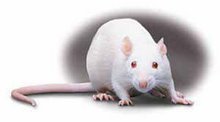I'm not a "morning person." Even on the best of work days, getting me out of bed takes a force of willpower comparable to running into a burning building. I've always been that way, even as a boy. I would stumble out of my bedroom in the mornings, skipping breakfast so I could get an extra ten minutes on the pillow, running late to catch the school bus at the last possible minute. I doubt I got many A's in the first-period classes. Still, no matter how much caffeine I pump into myself, I don't *really* wake up until about 10:30. I've also always been a "night owl," staying up 'til midnight or later. Unless I'm sick or totally exhausted (which happens more often now that I have kids), I simply can't fall asleep before 11PM, no matter how hard I try. It's my natural rhythm. Being sleep-deprived with kids has only heightened my morning pain. I'm certain when I finally croak it's going to be after trying to get up one early morning.
There have been times in my life when I've tried to change. Our society isn't very tolerant of night-owls / late-sleepers like me, viewing us as lazy for sleeping in, and as disorganized or party-crazy for staying up at night, no matter how much we do during the day. I had an agricultural science job for a little over a month, many years ago, where I had to get up while it was still dark, commute about 45 minutes, and report for work at the break of dawn. I tried very, very hard to change, going to bed by around 9:30PM whether I was tired or not, taking cold showers in the morning to wake up, and quaffing a higher-than-usual volume of caffeine. Have you ever seen "The Return of the Living Dead", where rag-dressed zombies shamble after hapless yet incredibly slow victims, arms outstretched and muttering, "Brains…."? Now take one of those zombies and put them in a field full of strawberries and fruit trees. That was me.
Can you tell I'm having trouble adjusting to the new time change?
In an interesting coincidence, many years back I landed in a doctoral program studying circadian rhythms of insects (a "circadian rhythm" is the scientific term for natural day-night cycles for animal behavior and physiology). To do this, I dissected about a zillion fruit flies under a dissecting microscope, pulling them apart with very fine forceps and teasing out their organs (Yes, the flies were usually alive when I did this. There is sure to be some sort of karmic retribution waiting for me. Any day now a thick swarm of fruit flies will descend on me and eat me like a gigantic banana, their natural prey). Anyhow, part of my studies was to examine the role of a gene called period (named for its periodic cycle of expression through the course of a day). This was also the only job I've ever had where I could choose my own hours – not unusual for academics. I usually wandered in around 10AM, worked until around 5PM, then came back in the late evenings for two or three more hours of work. I loved it (the work, that is. I can't say the same about the manic scientist who ran the lab and was my doctoral advisor), but I couldn't make a living on the meager earnings of a grad student and had to get a "real job."
Now it all comes full circle. Like so many other conditions related to our health and behavior, science has now linked my "night owl" circadian rhythm to my genes, even when it comes to effects of sleep deprivation (such as children crying in the middle of the night for, oh, two and half years). Molecular biologists and psychologists have been able to link human circadian rhythm to genes in humans which are analogues of the genes I studied in fruit flies, including period. One, in humans, is called period3, which comes in a "long" form and a "short" form, and has been shown to play a role in determining if humans are "larks" or "owls". The study to be published in the next issue of Current Biology demonstrates the role of this gene in the effects of sleep deprivation:
Story: http://www.physorg.com/news92670935.html
The journal abstract, for you science-types: HERE
Apparently, my period3 is "long" (No, I'm not menstruating). According to the article, "individuals with the longer variant of the gene performed very poorly on tests for attention and working memory [in the early morning hours]. Cognitive Psychologist Professor John Groeger, says: 'the early morning performance problems of those with the long variant have important implications for safety and efficiency at work.'" Those with the short form of the gene performed well.
So there ya go. I haven't been tested, but I'll bet I'm "genetically challenged," at least in the early morning. So if I come to work looking dreary-eyed and you try to bug me, I'm going to hold up may hand and snarl, "Talk to the genes!" then continue on my way to my morning dose of caffeine.
Now get some sleep!



2 comments:
i share your problem with sleep -- i've always been a night owl, but the serious problems started about 10 years ago, a result of having a kid and starting a business. the lack of sleep contributed to the destruction of my marriage and to the sharp decline of my level of fitness and health.
10 years is a long time and i'm just now making a conscious effort to get at least 6 hrs of sleep -- not always with success.
i wish someone had warned me about the consequences of the lack of sleep sooner -- i really thought i could go on like this indefinitely. but you can't. one way or the other, your body will stop you.
nice one, log on to www.unn.edu.ng
Post a Comment